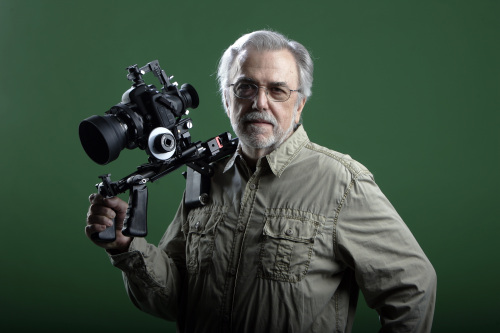Bill Pryor is living proof that a career in film (as it used to be called) can flourish far away from the coasts.
For almost 50 years, Pryor, 68, has specialized in “industrials,” promotional and training films made for corporate clients. The Texas native was studying journalism at the University of Oklahoma when he began to dabble in film.
He worked for a few years in St. Louis before joining Kansas City’s now-defunct Calvin Communications in 1968, when it was one of the world’s leading makers of industrials. Among those who cut their cinematic teeth there was Hollywood director Robert Altman.
Pryor has since gone freelance, and he has also branched out as a film craftsman for hire.
Here Pryor talks about learning his craft, the inexorable march of technology and the need not only to understand visual language but to have something worthwhile to say with it:
For almost 50 years, Pryor, 68, has specialized in “industrials,” promotional and training films made for corporate clients. The Texas native was studying journalism at the University of Oklahoma when he began to dabble in film.
He worked for a few years in St. Louis before joining Kansas City’s now-defunct Calvin Communications in 1968, when it was one of the world’s leading makers of industrials. Among those who cut their cinematic teeth there was Hollywood director Robert Altman.
Pryor has since gone freelance, and he has also branched out as a film craftsman for hire.
Here Pryor talks about learning his craft, the inexorable march of technology and the need not only to understand visual language but to have something worthwhile to say with it:

In 1968, going to work for Calvin was like going to Hollywood. At least if you worked in non-theatrical films. I was a writer/director. There were a dozen of us, plus a camera department with maybe 20 people.
We were continuously traveling. Most of our clients were out of town ― Caterpillar and John Deere were our big industrial clients. I was the John Deere guy. I learned how to hold a client’s hand. But I did lots of stuff. It was an education.
One of Calvin’s presidents said he’d never trust a guy who didn’t drink. A lot of parties, almost every night.
In those days you’d go to a Kansas City bar and always meet someone who worked for Calvin or a TV station. That’s how I met my wife. She was a film editor and news producer for local stations.
One of the first scripts I wrote for Calvin was for Sears. It was a training film about selling freezers that parodied the popular TV show “Rowan & Martin’s Laugh-In.” We even had “Laugh-In” stars Arte Johnson and Judy Carne as talent. Arte played his dirty old man character. Judy was the bikini girl who had things written on her body in paint.
I learned a lot from Arte just by hanging out and talking. “Laugh-In’s” comedy was faster than usual. They didn’t wait for a reaction. They’d just go on to the next joke. Arte helped me rewrite my script to reflect that.
Of course the Sears suits were on the set, and they got nervous when Judy came out in this revealing bikini. They protested to the director, who quietly told one of our guys to go to the Sears store on Truman Road and buy the skimpiest bikini they had. He had Judy Carne put it on, and it was more revealing than the first one. Even Judy was embarrassed to be wearing it.
The Sears guy couldn’t say a thing. It was their product, after all.
When technology changes, you have to be on top of it. You have to be aware of what’s going on and leap when the time is right.
I saw video coming along when I was at Calvin. John Deere wanted to shoot on video because it was cheaper than film, but Calvin wouldn’t do it. Calvin’s 16mm film developing lab was so profitable they could lose money on making a film and still make money on developing fees.
Within a couple of years it was obvious that video was a big train steaming down the tracks and you could either jump on board or get run over.
Artistically, film was better. But what’s better doesn’t always last.
When high definition came along a few years ago it was at first just for the big boys. Those high-end cameras cost more than $100,000, though the prices rapidly dropped as more cameras came on the market.
I started editing on the old hand-cranked flatbed film editing consoles. Now you can buy Final Cut Pro for about $1,200 and edit on a $1,200 laptop computer.
I’ve survived many years in a lousy market like Kansas City because I can carry on an intelligent conversation with a client.
I think there’s too much trade-school mentality in education these days ― teach the kid how to use Final Cut Pro and he can make money. He may learn how to make a documentary, but he won’t know enough about our culture and the world to say anything intelligent in it.
A decent film school can give you all the tools you need for the craft of the film business, but that’s not the same thing as an education.
Sure, there are always people with no education who make it in Hollywood. But those odds are horrible.
By Robert W. Butler
(McClatchy Newspapers)
(McClatchy-Tribune Information Services)









![[Kim Seong-kon] Democracy and the future of South Korea](http://res.heraldm.com/phpwas/restmb_idxmake.php?idx=644&simg=/content/image/2024/04/16/20240416050802_0.jpg&u=)







![[KH Explains] Hyundai's full hybrid edge to pay off amid slow transition to pure EVs](http://res.heraldm.com/phpwas/restmb_idxmake.php?idx=652&simg=/content/image/2024/04/18/20240418050645_0.jpg&u=20240418181020)

![[Today’s K-pop] Zico drops snippet of collaboration with Jennie](http://res.heraldm.com/phpwas/restmb_idxmake.php?idx=642&simg=/content/image/2024/04/18/20240418050702_0.jpg&u=)